Table of Contents
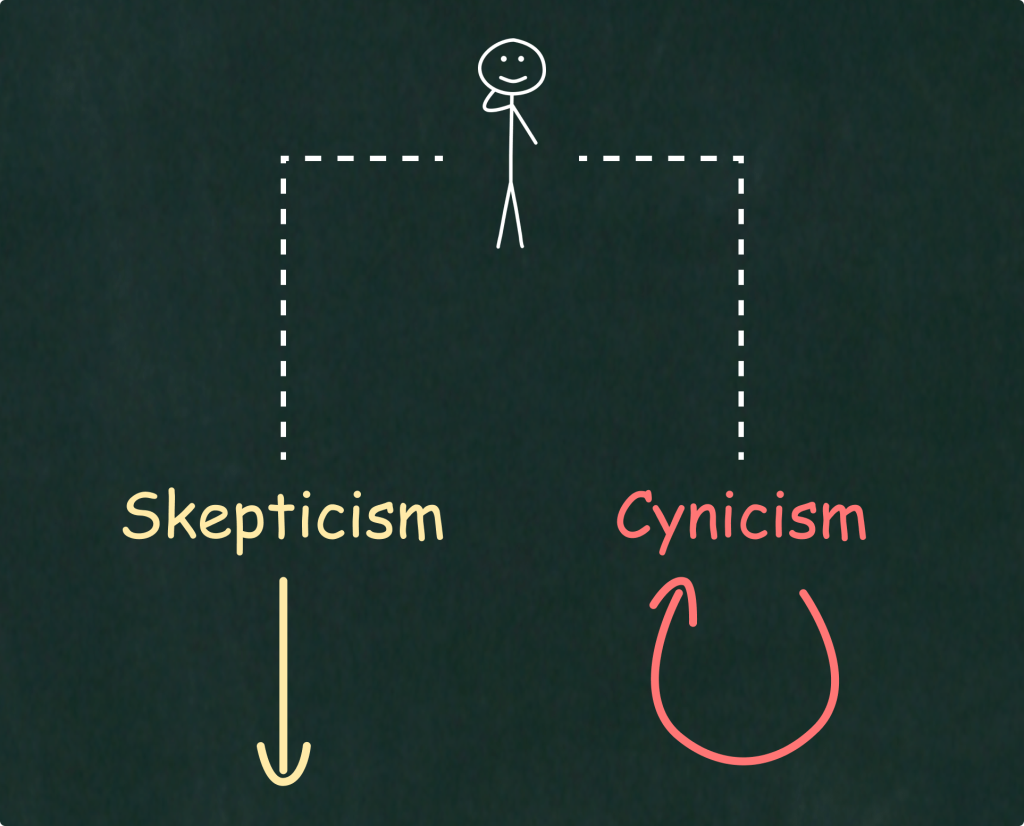
To understand the fundamental difference between skepticism and cynicism, we first need to grasp a clear understanding of each concept. So I’ve divided this essay into three parts: cynicism, skepticism, and optimism. I’ve added optimism because it really helps to see more clearly what cynicism and skepticism are.
As you go through each part, our main quest of identifying the difference in mindsets between skepticism vs. cynicism will become self-evident.
By the end of this article, you’ll not only be wiser but you’ll also gain an invaluable perspective on how to approach life and get what you want from it.
If you’re ready, let’s start!
What Is Cynicism and Why It Holds You Back
Cynicism is a mindset rooted in distrust, pessimism, and self-protection. It often looks like intelligence, but it leads to inaction and disconnection.
Cynics and pessimists often sound smart because their apparently “non-naive” view of everything gives them a kind of social prestige.
And they also strongly grab people’s attention, because as humans we’ve evolved to always pay attention to the negative, as that could be a risk to our survival and replication. This human bias to overweight the negative was officially introduced in Prospect Theory by Daniel Kahneman, who was also awarded the Nobel Prize in Economic Sciences in 2002 for this same theory. He demonstrated how we feel the pain of a loss more intensely than the pleasure of a gain of the same size (example: losing $100 hurts more than gaining $100 feels good). It’s also called “loss aversion.”
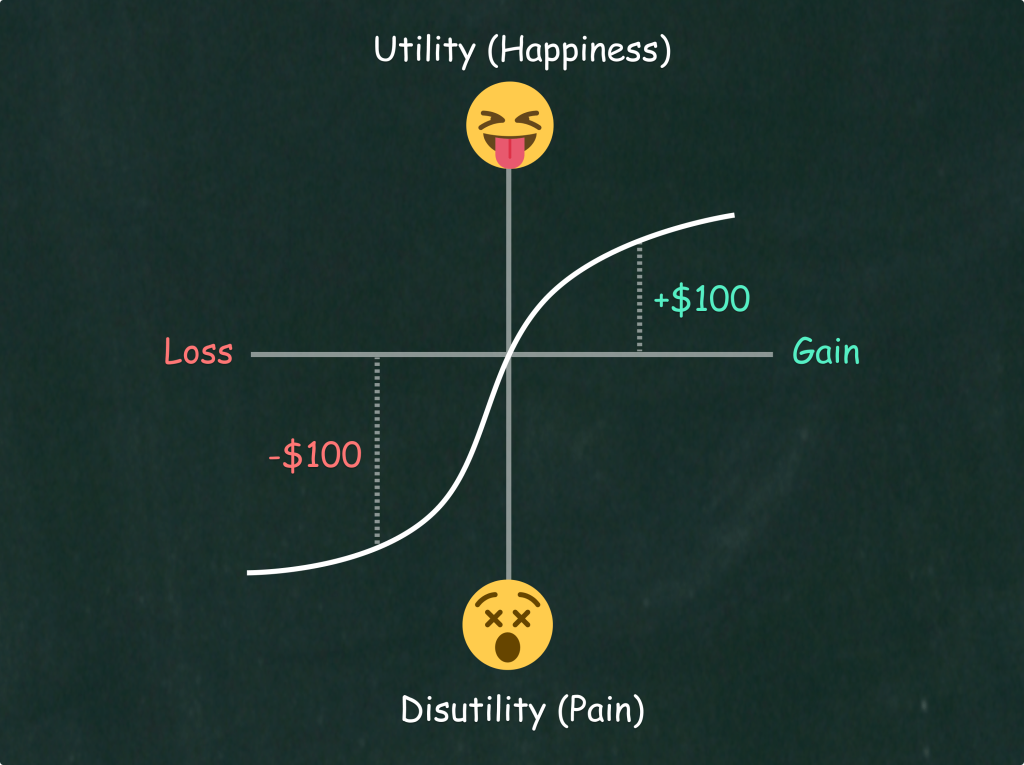
In the long run, though, it’s never worth it to be a cynic. Mainly because of two reasons:
1. Docility
Cynics may sound smart, but they rarely do anything meaningful with their lives. They are never “the man in the arena” — so they don’t know what triumph feels like, and they are almost sure to regret their cynical approach to life when they grow older and realize they never risked anything worthwhile.
The really cynical person and the really docile person have one thing in common: they never make bold moves.
– Balaji Srinivasan
[From the book – The Anthology of Balaji: A Guide to Technology, Truth, and Building the Future]
It is not the critic who counts; not the man who points out how the strong man stumbles, or where the doer of deeds could have done them better. The credit belongs to the man who is actually in the arena, whose face is marred by dust and sweat and blood; who strives valiantly; who errs, who comes short again and again, because there is no effort without error and shortcoming; but who does actually strive to do the deeds; who knows great enthusiasms, the great devotions; who spends himself in a worthy cause; who at the best knows in the end the triumph of high achievement, and who at the worst, if he fails, at least fails while daring greatly, so that his place shall never be with those cold and timid souls who neither know victory nor defeat.
– Teddy Roosevelt
Will you be a cynic,
Or will you be a builder?– Jeff Bezos
[From his speech at Princeton University in 2010]
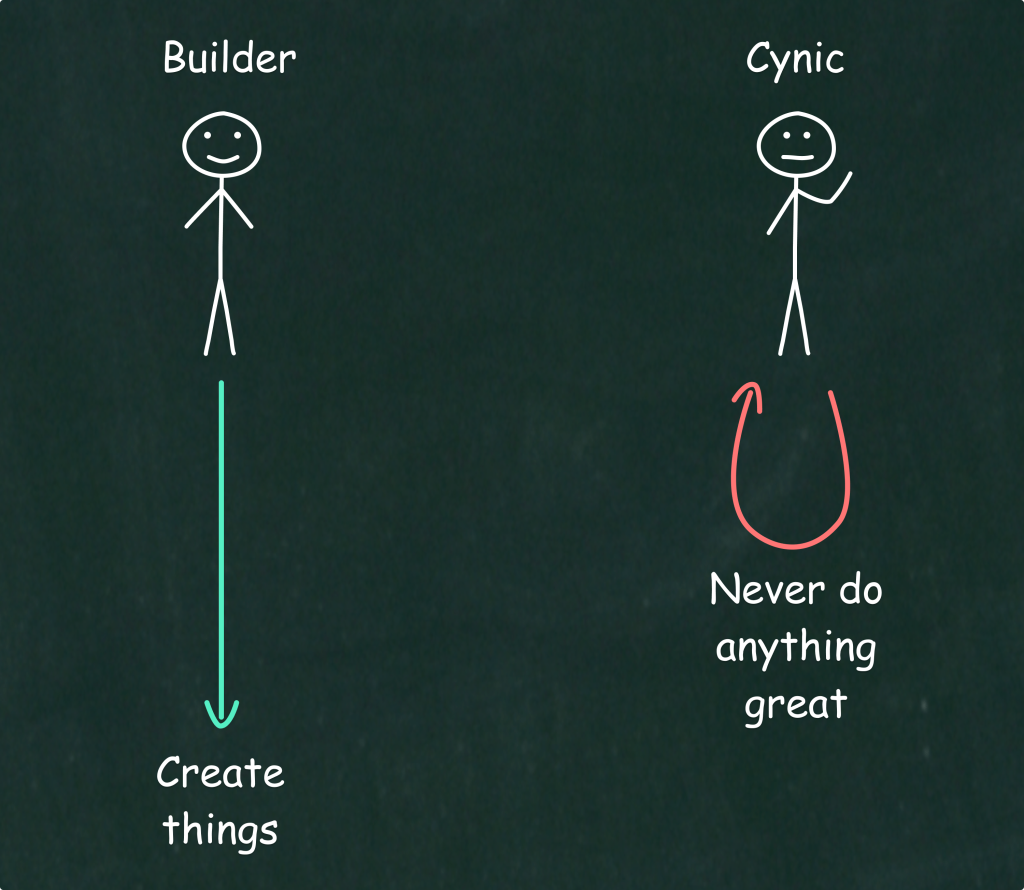
Cynics gain their “status” from criticizing others in a manner that is not constructive criticism (which would be helpful), but rather harsh critiques stemming from a place of insecurity and bad faith. And that criticism might make them feel good in the short term because it elevates their status by displaying their non-naive views, but in the long run, that criticism becomes a self-fulfilling prophecy…
Don't partner with cynics and pessimists. Their beliefs are self-fulfilling.
— Naval (@naval) May 31, 2018
Here’s what locks up the doors and the channels to receive more: cynicism.
That locks you away.
That prevents you from learning more.
Being a cynic about the past and the future. Cynic about the marketplace. Cynical about the people. Cynical about the institutions. Cynical about the setup. Cynical about yourself. Cynical about your chances.
See, that locks away all the chance for stuff to flow your way.
So, good advice today. Start off: be thankful.
– Jim Rohn
[Source: How to have the best year ever!]
2. Lack of Enthusiasm
Chris Williamson, host of the Modern Wisdom Podcast, said it best in an interview with Shaan Puri:
Cynicism is the opposite of enthusiasm, in some regards. And what I realized is… the people who were being cynical were doing it because it was like sour grapes at an existential level, I called it “the cynicism safety blanket” — that if you presume that things are going to be terrible you can never be disappointed by the world…
And it just seems like a coward’s way to live… and I understand people have had bad things happen to them, they’ve gone through traumas, they’ve had discrimination, they’ve had all of this stuff… I get it, I understand, and that would set you up to believe this may very well happen in the future.
But like… what does it do for you? What corn does it grow? Show me the corn that you’re growing from this… The corn you’re growing is fucking shitty. So yeah I think less cynicism, more enthusiasm!”
As Chris pointed out, it’s comfortable to have negative expectations, so that you’re not disappointed when a negative outcome happens. But it really is a cowardly and unproductive way to live one’s life. See it this way: You only exist on this Earth for a very brief time, so why not play it hard and have literally the time of your life?
Nothing great was ever achieved without enthusiasm.
– Ralph Waldo Emerson
Many people do not know what enthusiasm is. The so-called enthusiasm refers to “this is amazing!” – this level of enthusiasm and drive. I believe that an average-talented person who has an optimistic, positive and cooperative attitude towards the world will earn more money and win more respect as compared to a talented but pessimistic, passive and uncooperative person.
Regardless of whether a person is dealing with trivial things, difficult tasks or important plans, as long as he is dedicated and enthusiastic to complete, the results will be far better than smart but lazy people. Because concentration and perseverance account for 95% of a person’s ability.
– John D. Rockefeller
[From his book – The 38 Letters from J.D. Rockefeller to his son: Perspectives, Ideology, and Wisdom]
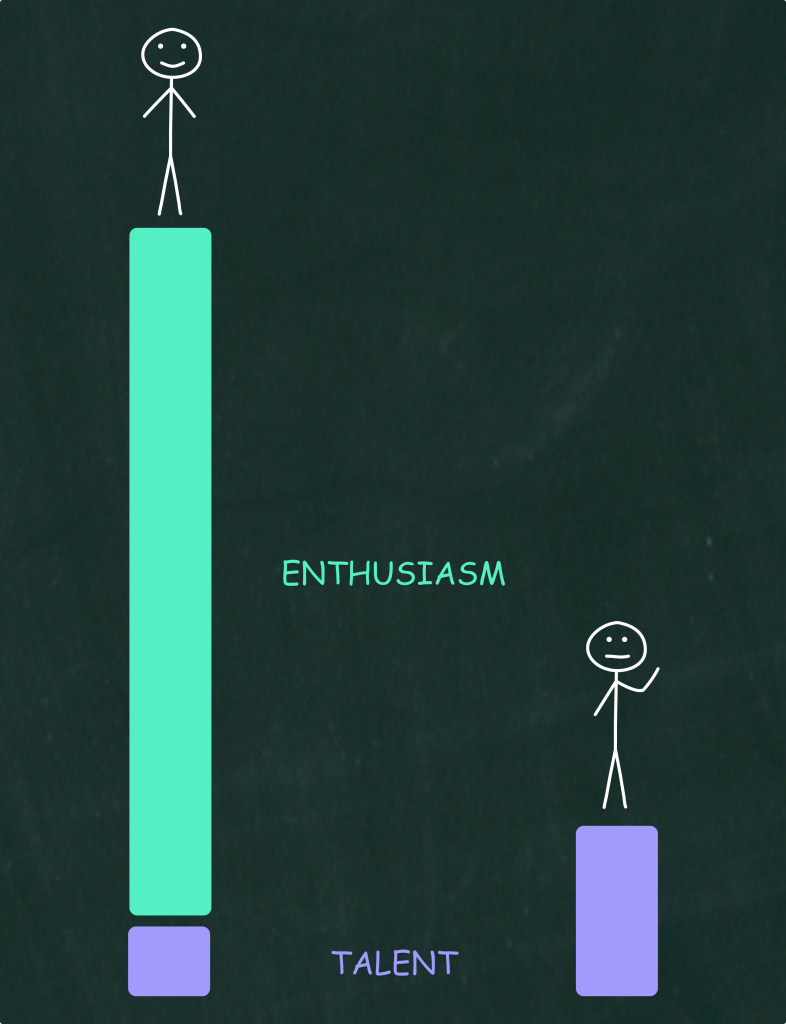
Optimists achieve things.
— Paul Graham (@paulg) May 21, 2020
How Skepticism Fuels Growth, Truth, and Progress
People often confuse cynicism with skepticism. But they are day and night.
Skepticism is the practice of questioning claims, including your own. Unlike cynicism, it’s motivated by curiosity and a desire for truth and progress.
Peggy Noonan, a renowned columnist at The Wall Street Journal, said it best in her article “We Must Improve Our Trust”:
Realize there’s a difference between skepticism and cynicism, that one is constructive and the other childish.
Skepticism involves an intellectual exercise: You look at the grand surface knowing it may not reflect the inner reality. It implies action: If it doesn’t, try to make it better.
Cynicism is a dodge: Everything’s crud, you’d be a fool to try and make it better, it’s all irredeemable and unchangeable.
Contrary to the cynic, the skeptic is someone who actually wants progress. He or she might appear cynical on the surface due to their frequently disagreeable nature. But while the cynic’s disagreeableness comes from a place of insecurity and fear, the skeptic’s disagreeableness comes from a place of curiosity and wanting to know what’s true.
The skeptic understands that in order to make real progress, they need to start with the truth.
You can only make progress when you’re starting with the truth.
– Naval Ravikant
[From the book – The Almanack of Naval Ravikant]
And they also understand that to know the truth about anything, one has to challenge other people’s views and one’s own views. They understand that their ego and blind spots are forever enemies of their judgment.
The hard thing is seeing the truth. To see the truth, you have to get your ego out of the way because your ego doesn’t want to face the truth.
The smaller you can make your ego, the less conditioned you can make your reactions, the less desires you can have about the outcome you want, the easier it will be to see the reality.
– Naval Ravikant
[From the book – The Almanack of Naval Ravikant]
Aristotle defined tragedy as a terrible outcome arising from a person’s fatal flaw — a flaw that, had it been fixed, instead would have led to a wonderful outcome. In my opinion, these two barriers — ego and blind spots — are the fatal flaws that keep intelligent, hardworking people from living up to their potential.
– Ray Dalio
[From his book – Principles]
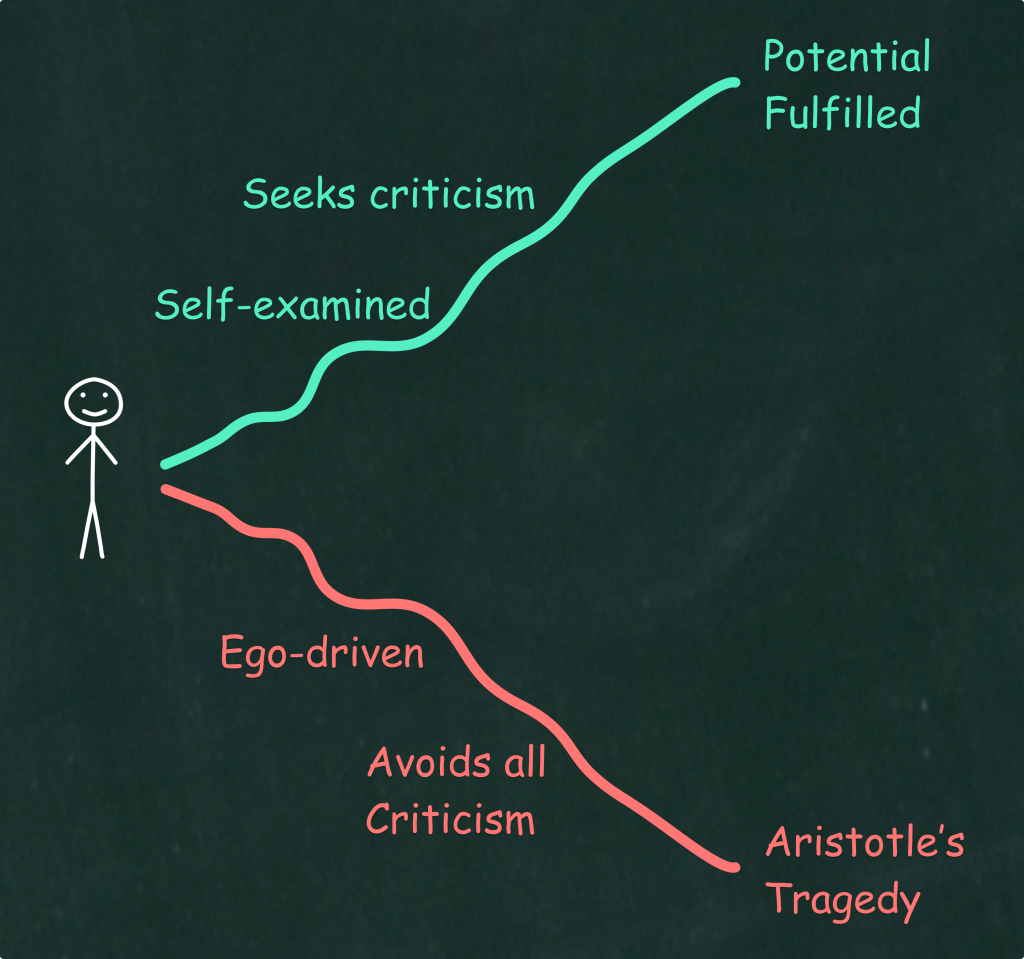
The Two Types of Optimism, and Which One Actually Works
After reading the section on cynicism, you might think optimism is always good. But that’s not the case. Optimism comes in two forms: Complete Optimism and General Optimism. And it’s only the latter that’s actually a supportive type for one’s life. Let me explain each type:
The Complete Optimist
The Complete Optimist is someone who is optimistic about everything. He has dreams and goals, but he can’t see reality the way it is. To see reality as it is, you need skepticism rather than optimism. Therefore, he is a dreamer and he stays a dreamer, never being able to make any meaningful progress.
And because he’s optimistic about everything, he has a significant “risk of ruin” in high-stakes situations.
Example: When it comes to money, a Complete Optimist would be positive and confident that he can achieve financial freedom, but he would also be as confident that the “stock tip” he just got from Jim Cramer in the morning will get him to financial freedom. This is, of course, naive optimism, and it can be very dangerous.
The General Optimist
The General Optimist is someone who is optimistic about the general mission of whatever they are doing, but not necessarily optimistic about the specific instances or prototypes required to accomplish the mission.
Example: In relation to money, a General Optimist would be positive and confident that he can achieve financial freedom, but he’s not necessarily confident that the “newest investing strategy” he just read an hour ago on Business Insider will get him to financial freedom.
The General Optimist has a positive outlook on life. They have high levels of enthusiasm and self-belief. This is the type of optimism that has driven ordinary individuals to achieve extraordinary success.
The greatness of Zemurray lies in the fact that he never lost faith in his ability to salvage a situation. Bad things happened to him as bad things happen to everyone, but unlike so many he was never tempted by failure. He never felt powerless or trapped. He was, as I said, an optimist. He stood in constant defiance. When the secretary of state teamed up with J. P. Morgan and the Honduran government in a way contrary to Zemurray’s interests, he simply changed the Honduran government. When United Fruit drew a line at the Utila River and said, “You shall not cross,” he crossed anyway. When he was forbidden to build a bridge, he built a bridge but called it something else. For every move, there is a countermove. For every disaster, there is a recovery. He never lost faith in his own agency.
– Rich Cohen
[From his biography on Samuel Zemurray – The Fish that Ate the Whale]
Mueller’s father told him [Mueller] there were millions of kids coming out of college. The space shuttle era had just dawned. Everyone wanted these jobs. Why did he think he had a chance of getting one?
“I think that’s why Elon [Musk] liked me, because I was very optimistic,” Mueller said.
“And my dad was really a pessimist, so I don’t know where I got the optimism, but I’m just like, ‘No, I’m going to go get a job and build rockets. I’m going, I’m doing it. Nothing’s stopping me.’”
– Eric Berger
[From his book – Liftoff: Elon Musk and the Desperate Early Days That Launched SpaceX]
Now, the real magic happens when the General Optimist adopts a skeptical approach towards the specifics.
Example: While he is confident he can become financially free, he would be skeptical about the newest investment strategy that promises to make him rich in five years.
In an interview with Niklas Anzinger, Naval Ravikant laid it out perfectly:
The thing that I think is important is to be rigorous, is to actually stay as truth oriented as possible.
So you want to be optimistic in the general, you want to be optimistic that “yes, I can find something interesting here.”
But you want to be skeptical about the specific. You don’t want to just believe every claim that comes along, and I find that a lot of times when people are entering new fields they just believe everything. For example, 10 people will approach you [and] they’ll tell you 10 different therapies. They’ll only tell you the upsides! Well it’s like… if you believe all of them you’re going to die because you’re going to take all 10 of those shots and one of them will kill you… Or at least hurt you.
So you do have to be skeptical about the specifics, but you can be optimistic in the general.
What’s really bad is to be pessimistic in the general [the cynics]… because then you’re just going to lose no matter what. And then be optimistic in the specific because then you’re trying lots of things and you have “risk of ruin” on the downside.
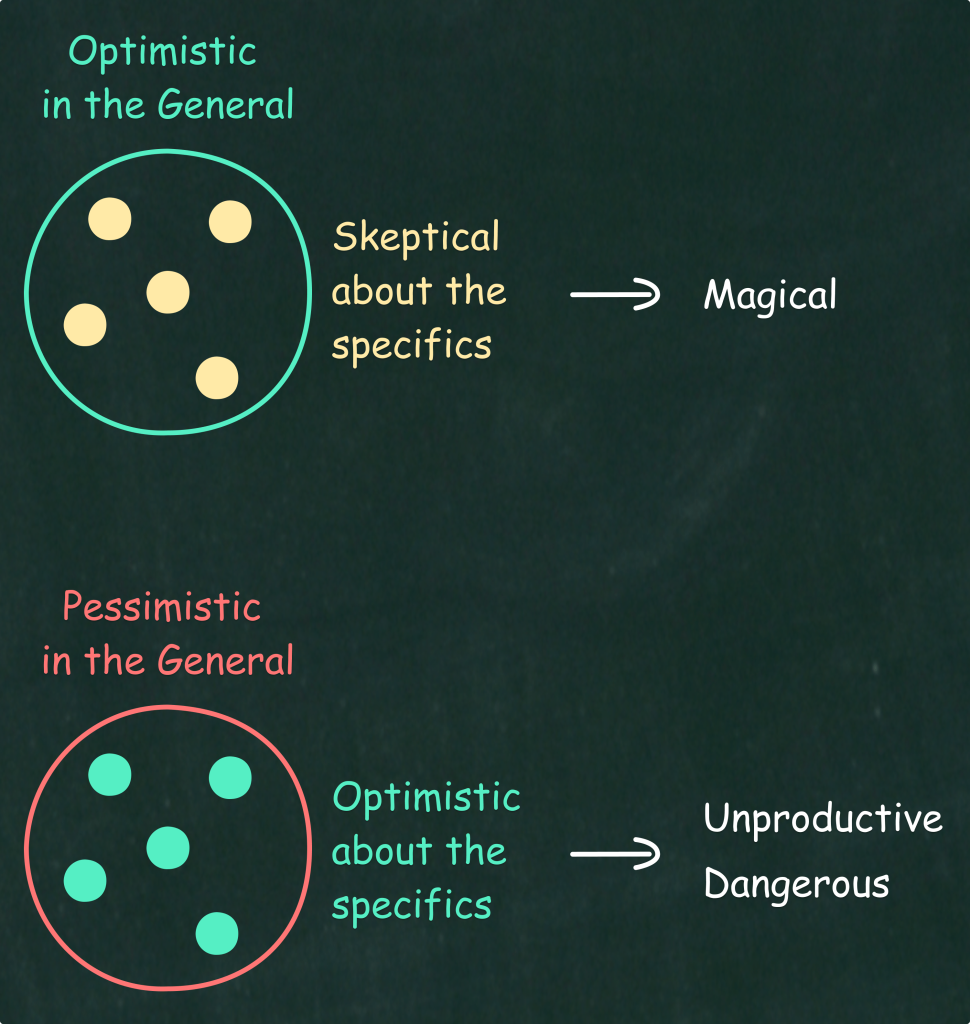
The Winning Mindset: Optimism in the General, Skepticism in the Specific
We’ve seen that cynicism is never a good approach to life. A mix of optimism and skepticism is key to having exciting dreams or goals and actually achieving them.
Be a General Optimist so that you can gather the self-belief and confidence to pursue your dreams. And then be a skeptic on the specifics — that is, skeptical of the specific solutions that promise to fulfill your dream or subparts of your dream.
If You Liked This Essay, Check Out These Sources
- The Anthology of Balaji: A Guide to Technology, Truth, and Building the Future, by Eric Jorgenson
- Jeff Bezos’s speech at Princeton University in 2010
- Jim Rohn: How to have the best year ever!
- Chris Williamson’s interview with Shaan Puri
- The 38 Letters from J.D. Rockefeller to his son: Perspectives, Ideology, and Wisdom, by John D. Rockefeller
- Peggy Noonan’s article “We Must Improve Our Trust”
- The Almanack of Naval Ravikant, by Eric Jorgenson
- Essay “Winning Arguments vs. Winning in Life: Why You Are Pursuing The Wrong Thing“
- Principles, by Ray Dalio
- The Fish that Ate the Whale, by Rich Cohen
- Liftoff: Elon Musk and the Desperate Early Days That Launched SpaceX, by Eric Berger
- Niklas Anzinger’s interview with Naval Ravikant
Knowledge vs. True Opinion: How To Determine if What You Believe Is Worth Defending
How do you become more confident and courageous in your beliefs and objectives—especially when confronted with an opposing viewpoint? To say this another way, "what important truth do very few…